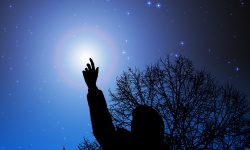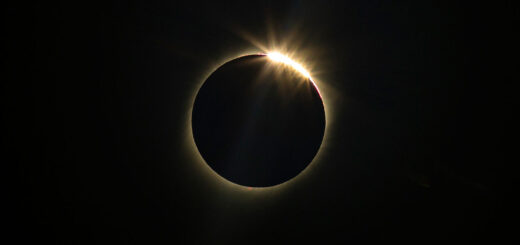10 Superstitions About Stars

In the days before the world was so readily connected — before the Internet, round-the-clock news stations, telephones and radio — humans relied on the natural world around them to make predictions about the future and help guide their choices. This meant listening to nature and looking up to the heavens for clues from the stars. Many starry superstitions date back thousands of years. Some are inspired by pagan customs and other ancient religions, while others are more recent. From agriculture to sailing, from love to luck, the stars have long been shrouded in superstition. Read on to learn how studying the stars in the skies can reveal important beliefs.
10: Hands to Yourself
Has anyone ever told you it’s rude to point? Superstition reveals that pointing at the stars can be just as frowned upon as pointing at a stranger on the street. The legend stems from the ancient belief that the stars were actually gods or other supernatural beings peering down at Earth from the heavens. Pointing at a star, therefore, meant you were actually pointing at a god [source: Webster]. This could anger the god, bringing unwanted attention and bad luck down on the pointer and his or her family. In some cases, a simple point was thought to mean much more than a bad day — actually having the potential to bring death upon the pointer [source: Roud]. Talk about overkill.
9: Falling Souls
Shooting stars, also known as fallen stars, send streaks of light across the night sky before burning out into a point of inky blackness. Superstition has it that simply spotting one of these stars as it falls can bring good luck, though the rationale behind this custom changes based on who’s telling the story. Some cultures claim that fallen stars represent souls that have been released from purgatory, allowing them to finally begin the ascent to heaven and peace. In Britain and other areas, a shooting star represents the soul of a new baby falling to Earth, ready to begin a new life [source: Murrell]. Either way, the shooting star is said to possess a bit of magic, which means positive vibes and good luck for anyone who happens to gaze upon one.
8: Make a Wish
Given the magic associated with shooting stars, it’s no surprise that there’s more than one superstition linked to them. While many cultures suggest that gazing upon these stars brings good luck, some believe you can use shooting stars for more precise purposes. Worried about your empty wallet? Park yourself outside on a starry night and wait for a fallen star. If you say the word “money” three times before the star burns out, you’ll soon be on your way out of poverty [source: Webster]. Struggling with acne? Hold a rag or cloth over your blemishes as a shooting star streaks through the sky to get rid of pimples. Don’t just use your hand though, as this will simply transfer the marks to them; stick to a cloth or rag to rid yourself of the affliction for good [source: Radford and Radford].
7: Lucky Stars
Some shooting star superstitions can affect your life without any action on your part, but the type of luck you end up with could depend on something as random as where the star is positioned in the sky. If you spot a fallen star on your right, it means good luck, while one on your left indicates misfortune will follow. If you’re quick, you may be able to shift position as the star travels in an attempt to change your luck [source: Dillon]. Shooting stars also bring luck on the road. Spot one while on a trip, and your voyage is guaranteed to be a success [source: Goldsmith].
6: Star Light
Even stationary stars can boost your luck, at least according to folklore. In particular, the first star that shines in the night sky each evening possesses special magic. In England and some other parts of the world, setting your gaze on the first star that appears after dark and making a wish is enough to win your heart’s desire. In other cultures, you must recite a particular nursery rhyme or poem as you silently focus on your wish. This superstition is associated with the “Star Light, Star Bright” nursery rhyme popular among children and parents [source: Webster].
5: Farming Superstitions
Farmers and others have used the stars to predict the weather since ancient times. One superstition from England warns that there will be a poor harvest when the evening star is low in the sky, while the appearance of Sirius, or the Dog Star — one of the brightest stars in the sky — means drought is on the way [source: Dillon].
If you’re wondering whether it will rain in the coming days, check out the constellation Cancer. For thousands of years, people have relied on Cancer’s Beehive star cluster to predict a storm. Superstition has it that when the sky is clear but the Beehive is difficult to discern, rain is sure to follow [source: Rao].
4: Stars at Sea
Like farmers, fishermen and other seafarers have their own star-related superstitions. By observing the direction that a shooting star travels, sailors can predict which way the winds will blow — useful information for when instruments go down, or for those out at sea in ancient times [source: NOAA].
The North Star has always served as a powerful navigating tool at sea, allowing sailors to calculate latitude and determine the correct course to reach their destination. Sailors also believe that a glimpse of the North Star is good luck because it means their vessel is close to home. In more recent times, seafarers have been known to court luck with tattoos of the North Star as a way of carrying on this ancient tradition.
3: Let It Rain
Wondering whether it will rain soon? Ask the man in the moon. Superstition dictates that observing how stars are positioned in relation to rings around the moon can help you predict the weather. A ring around the moon with a single star situated inside means clear weather ahead. If you spot more than one star inside the ring, you can count the stars to determine how many rainy days will occur in the coming week.
Different cultures have their own variations of this superstition. In some parts of the United States, a ring around the moon with two stars inside means that rain is coming inside of two days. Others equate seven stars around the moon, for instance, as a prediction that seven hours of rain will follow [source: Thomas and Thomas].
2: Make It Count
Counting the stars may be a good way to pass the time on a clear night, but superstitious folks should skip counting in favor of other pastimes. Counting the stars has always been considered a surefire way to bring on bad luck, and some legends state that if you attempt to count the stars in the sky, you’ll die when you reach 100 [source: Dillon]. Some believe that this superstition stems from ancient people who worshipped the sun, moon and stars, while others argue it’s a more recent custom [source: Roud].
Of course, with at least 200 billion stars in the galaxy, it’s likely that you’d die of natural causes well before you could get very far into your count, lending this superstition an air of credibility [source: NASA].
1: Love in the Stars
It’s well established that attempting to count the stars can be unlucky or even fatal, but one superstition holds that it’s OK to count under very specific circumstances. According to folklore, only an unmarried person looking for love can keep a tally. Even in this case, the unmarried person can count a maximum of seven stars on seven consecutive nights. If you do this, the first person of your preferred sex that you shake hands with on the eighth day is the one you’ll marry. For those struggling to find the one, it seems like a harmless way to not only locate love, but also a chance to finally count the stars without fear of inviting bad luck into your life [source: Radford and Radford].
Author’s Note: 10 Superstitions About Stars
The first time I really saw the stars, I was in my early 20s. Sure, I’d taken a peek up at the night sky once or twice before then, but because I grew up in a busy east coast city, I never really got to see much. It wasn’t until I took a cross-country road trip after college and ended up camping in a secluded area in eastern Texas that I really saw the night sky in all its glory. When you finally get to see the full effect of a sky full of stars, it’s easy to understand just why ancient people were so fascinated — and why they believed they might find answers in those far-off spots of light.



 Creators of mankind
Creators of mankind Description of “Tall white aliens”
Description of “Tall white aliens” Where they came from?
Where they came from? About hostile civilizations
About hostile civilizations The war for the Earth
The war for the Earth “Tall white aliens” about eternal life
“Tall white aliens” about eternal life Video: “Nordic aliens”
Video: “Nordic aliens” Aliens
Aliens Alien encounters
Alien encounters The aliens base
The aliens base UFO
UFO Technology UFO
Technology UFO Underground civilization
Underground civilization Ancient alien artifacts
Ancient alien artifacts Military and UFO
Military and UFO Mysteries and hypotheses
Mysteries and hypotheses Scientific facts
Scientific facts


















